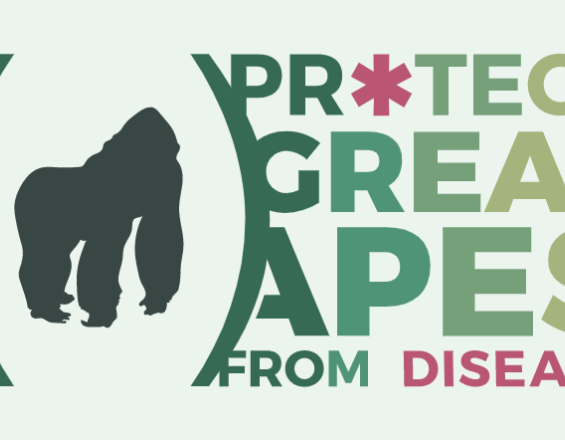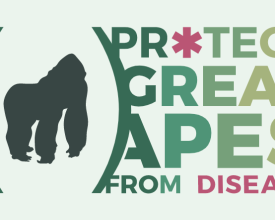Grands singes - COVID-19 Orientation

Lorsque la pandémie de COVID-19 est apparue, les scientifiques et les gestionnaires de la conservation ont commencé à s'interroger sur l'impact qu'elle aurait sur leurs recherches, leurs efforts de conservation et le bien-être de la faune mondiale. Les primates sont sensibles aux mêmes maladies que les humains, et le groupe de spécialistes des primates de la CSE de l'UICN avait déjà élaboré des orientations sur les meilleures pratiques pour la protection des grands singes contre d'autres maladies respiratoires dues à la présence de touristes et de travailleurs sur le terrain. Le groupe a commencé à recueillir des questions sur l'impact du COVID-19 sur les grands singes auprès des gestionnaires de zones protégées, des gardiens de zoo, des chercheurs sur le terrain et d'autres personnes dont le travail est directement lié à ces animaux. Un groupe de travail a été constitué et des lignes directrices sur la manière d'aborder la conservation des grands singes face à cette nouvelle pandémie mortelle ont été rédigées et partagées. Ces lignes directrices s'adressaient aux chercheurs et aux défenseurs de l'environnement, mais elles ont depuis été développées et retravaillées pour d'autres publics, notamment les industries extractives, les gouvernements et les équipes chargées de sites spécifiques.
Contexte
Défis à relever
La pandémie de COVID-19 a plongé le monde entier dans un état d'urgence et a contraint tous les secteurs à modifier rapidement leurs méthodes de travail. Le manque d'informations immédiatement disponibles sur le COVID-19 a constitué un défi majeur pour la plupart des défenseurs de l'environnement qui tentaient de poursuivre leur travail en toute sécurité, tant pour eux-mêmes que pour les animaux. Les publications précédentes du Groupe de spécialistes des primates de la CSE de l'UICN leur ont fourni un point de départ à partir duquel ils ont pu élaborer efficacement une première orientation sur la manière de travailler en toute sécurité sur les grands singes dans le cadre d'une crise de maladie respiratoire.
Emplacement
Traiter
Résumé du processus
La pandémie de COVID-19 a été une période difficile et éprouvante pour tout le monde. Les membres enthousiastes du Groupe de spécialistes des primates de la CSE de l'UICN ont mis à profit leur expertise et leur expérience en matière d'élaboration de lignes directrices pour surmonter efficacement la crise. Ils ont rassemblé des informations provenant de sources fiables, à la fois leurs propres travaux publiés et ceux d'experts extérieurs au groupe, et ont stratégiquement élaboré un nouvel ensemble de lignes directrices spécifiques à la réalité en constante évolution du COVID-19.
Blocs de construction
Synthèse des connaissances
Il existe des directives sur la manière d'observer les grands singes et d'interagir avec eux tout en protégeant leur santé et celle des humains. Alors que les lignes directrices précédentes traitaient d'autres maladies respiratoires, il n'existait pas de protocoles spécifiques au COVID-19, car les recherches et les informations commençaient à peine à être disponibles. Le groupe de travail a recueilli des informations auprès d'un large éventail de sources, en s'assurant de recueillir les détails les plus récents et les plus pertinents, et les a synthétisées dans un document clair et cohérent.
Facteurs favorables
Les lignes directrices précédemment publiées par le groupe de spécialistes des primates de la CSE de l'UICN et les membres passionnés du groupe ont été des facteurs clés qui ont permis au groupe de travail de créer rapidement des protocoles spécifiques à COVID-19. Le fait de pouvoir s'appuyer directement sur des ressources évaluées par des pairs a simplifié le processus et a permis au groupe de créer en toute confiance de nouvelles lignes directrices malgré le manque d'informations sur COVID-19 disponibles à l'époque.
Leçon apprise
Le groupe de travail a puisé ses connaissances au-delà des seuls primatologues spécialistes des grands singes. Bien que leur expertise ait été un facteur déterminant tout au long du processus, le fait d'inviter d'autres personnes à contribuer a permis d'intégrer une diversité de bases de connaissances dans les lignes directrices. Les informations disponibles sur le COVID-19 ayant fait l'objet d'un examen par les pairs étaient encore insuffisantes à l'époque, et l'élargissement du groupe d'experts a permis d'élaborer un ensemble de lignes directrices plus complet et plus utile.
Priorité à la crise
Au cours des premiers mois de l'année 2020, la pandémie de COVID-19 a suscité beaucoup de confusion et de stress dans le monde entier. Face à cette réalité radicalement changeante, le Groupe de spécialistes des primates de la CSE de l'UICN a su se réunir rapidement et efficacement pour identifier les besoins des chercheurs, rassembler les informations pertinentes et créer un ensemble essentiel de lignes directrices. Une mobilisation rapide du réseau mondial de spécialistes des grands singes a permis de traduire la publication en plusieurs langues, diffusant ainsi cet outil crucial aux personnes travaillant sur le terrain dans de nombreuses régions.
Facteurs favorables
L'adhésion active et participative du groupe de spécialistes des primates a été déterminante pour l'établissement des priorités de travail face à une pandémie mortelle sans précédent.
Leçon apprise
Alors que la crise du COVID-19 balayait le monde entier, de nombreuses personnes ont cherché à donner une nouvelle raison d'être à leur travail. Les membres du groupe de spécialistes des primates ont été motivés par le sentiment d'urgence qui s'est emparé de toutes les couches de la société et ont voulu agir de manière positive. Ces lignes directrices étaient essentielles non seulement pour que les gens puissent continuer à travailler sur le terrain en toute sécurité, mais aussi pour les membres qui cherchaient à trouver un sens à cette période particulièrement sombre.
Impacts
La pandémie de COVID-19 a soulevé des questions sur la manière d'avancer en toute sécurité dans tous les domaines de travail, y compris la conservation et la recherche. Une grande partie du travail dans ce secteur ne peut pas être effectuée à distance, et il était donc nécessaire de fournir des conseils sur la manière de procéder en toute sécurité, tant pour les humains que pour les grands singes, afin que les projets et les tâches puissent se poursuivre. Ces lignes directrices fournissent des recommandations, y compris des exigences minimales et des meilleures pratiques supplémentaires, sur la manière de minimiser la transmission entre les hommes et les grands singes. Le travail de conservation essentiel, tel que le suivi et l'observation, a pu se poursuivre malgré les difficultés rencontrées à cette époque. Alors que d'autres secteurs commençaient à s'adapter aux réalités de la pandémie, d'autres lignes directrices créées par le groupe de travail ont permis à d'autres entreprises de mettre en place des mesures appropriées pour réduire la propagation du virus à l'origine du COVID-19. Il s'agit notamment de l'industrie de l'écotourisme, dont beaucoup d'endroits dépendent pour leurs revenus et comme incitation à la conservation.
Bénéficiaires
- Les grands singes
- Les écosystèmes environnants, y compris les autres espèces sauvages
- Les chercheurs sur le terrain et les défenseurs de l'environnement
- Le secteur du tourisme et les personnes qui en dépendent
